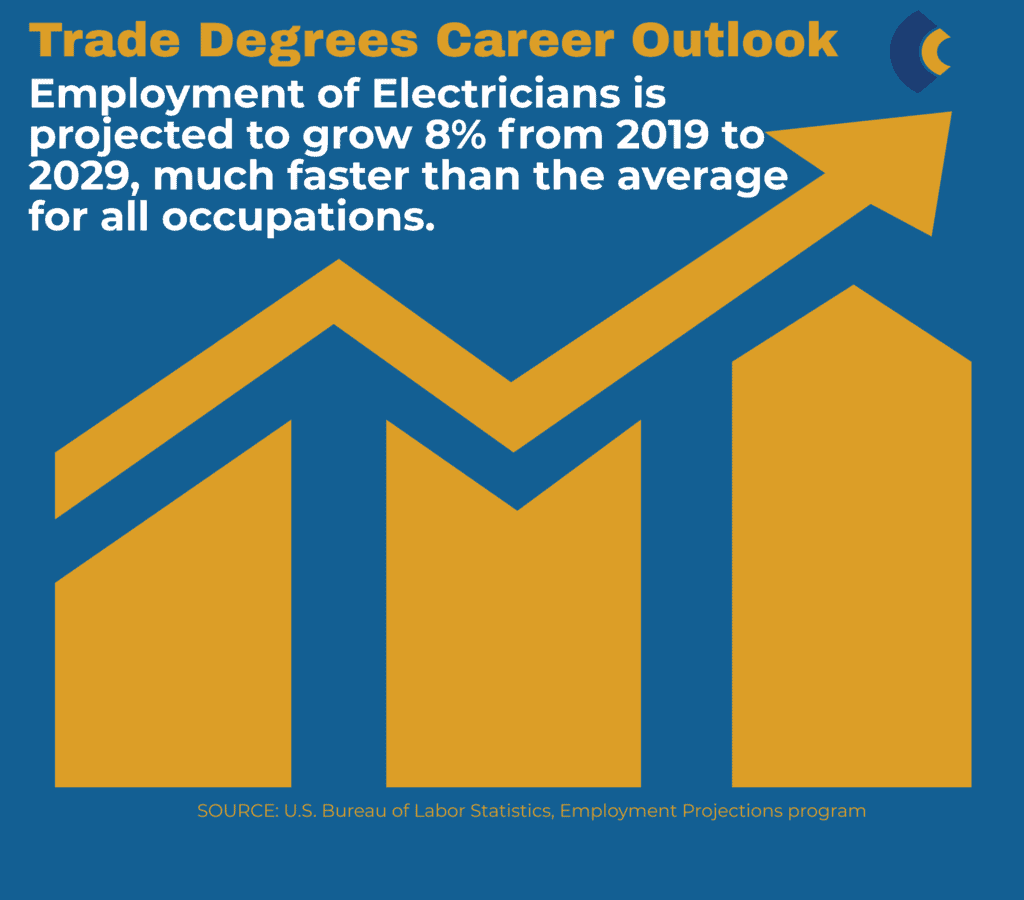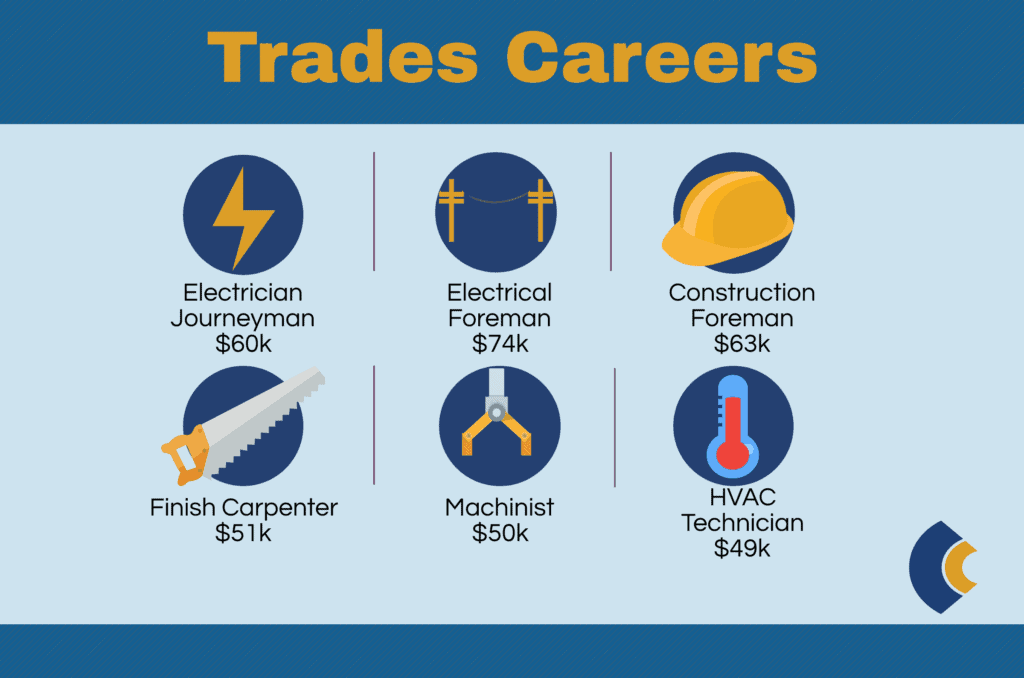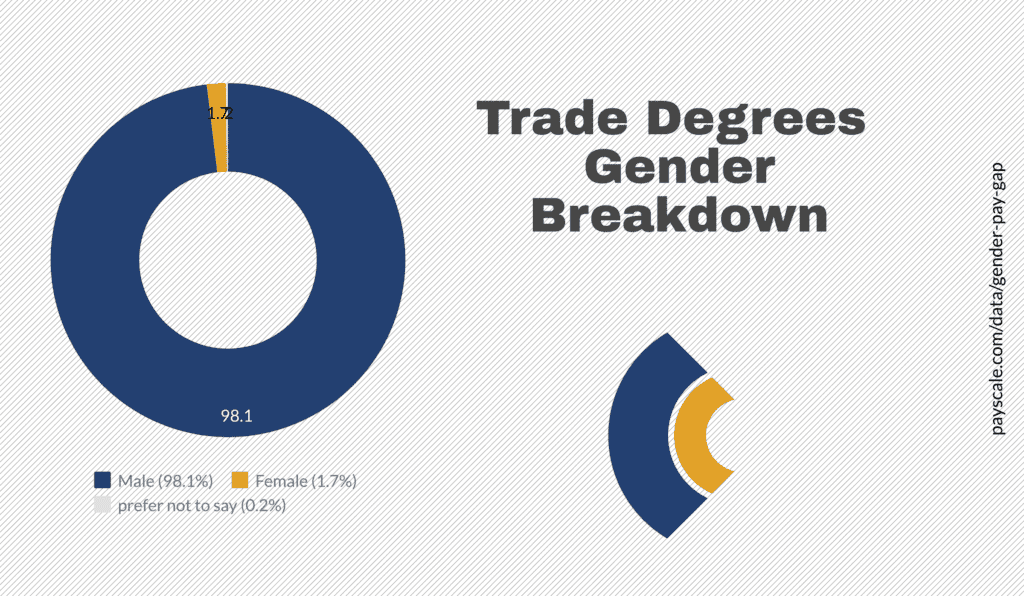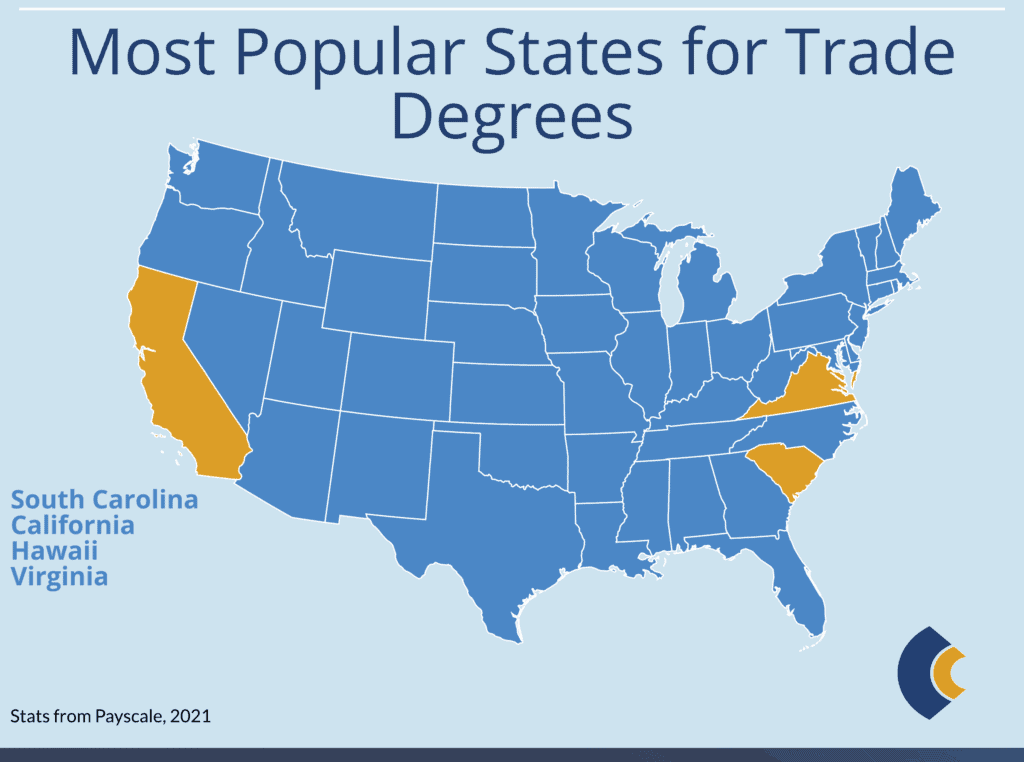For the purpose of this narrative, a trade is defined as an occupation that mandates an employee holds a particular set of mid-to high-level skills. A trade can be the creation of something that is both functional and artistic (think carpentry!) or a vocation that offers a strictly functional purpose, like that of a professional electrician.
As such, a trade school job is considered an occupation that aligns with the above definition. Students train for a trade career by enrolling in a technical institute, professional school, vocational/community college, and university.
What is a Trade School?
For many students who are or will be graduating from high school, the thought of pursuing a college degree may be either out-of-reach financially or simply not a future objective for the student. The excellent news for students is that there are a variety of affordable pathways that offer professional development opportunities instead. Read further on to learn about the importance of vocational training as a viable option to a traditional four-year college/university.

Unlike a traditional academic degree program, a trade school does not require credits, just technical training for what trades are there and offered by the school. Program lengths are shorter, which allows students to enter the workforce sooner, generally with less debt.
So, what is a trade school? Trade schools are also referred to as vocational schools and technical colleges, and they offer focused, specialized training in high-demand occupations – different types of trades. In addition, trade schools are also known as CTE’s – Career and Technical Programs.
But, how does one know whats a trade? What trades are in demand, or how to choose a trade?
These are all relevant and important questions to ask when considering the importance of trade school. In addition, it is critical that students personalize these questions to fit their specific scenario. Consider these inquiries that may relate to your situation when considering – What trade should is right for me.
What Trade Should I Do?
In addition to asking yourself – What trade should I do? – it is wise tofind the answers to these questions –
- What trades are there, and which types of trades would suit your skills and interests?
- What trades are in demand and offer the highest salaries?
- Is the importance of vocational training related to what trade is right for me?
- What’s a trade skill that would meet my skill set?
- What trade should I do if I prefer working with my hands?
Trade schools provide the student with hands-on training in preparation to work in their chosen field.
What Trades are There?
The variety of trades range from electricians to carpenters to HVAC techs, to plumbers and welders, often work that includes some manual labor and specific, focused training. These various options are discussed below.
In sum, a trade school is a great tool to use if you wish to gather the initial experience to become competitive in a job market without pursuing an academic degree.
Accreditation for Trade and Technical Schools
Program or school accreditation is an evaluation process in which an approved accreditation agency evaluates a school or program’s content and quality against a set of predefined standards. Aspects included in the review include –
- The curriculum.
- The learning outcomes and graduation rates.
- Faculty members.
- Student support, among others.
Accreditation occurs at two fundamental levels – regional/institution & specialized, each of which is discussed in detail next.
Regional Accreditation
The federal government administers the process of regional accreditation by its nine Regional Agencies within the United States (DOE) Department of Education thatmanages these agencies (USDE). Regional accreditation is awarded to colleges, schools, or universities.
Specialized Accreditation
In addition to regional accreditation, colleges, schools, and universities also voluntarily subject themselves to the process of specialized accreditation. Specialized accreditation agencies are typically approved by industry experts and set forth the criteria against which the programs are judged.
Are Trade Schools Accredited?
Like most education degrees, trade school accreditation is awarded to those schools that meet the trade school accreditation standards. The primary accrediting agency that is responsible for most accredited trade schools is the ACCSC.
The Accrediting Commission for Career Schools & Colleges (ACCSC)
The ACCSC – the Accrediting Commission for Career Schools and Colleges is an accrediting organization that is sanctioned by the U.S. (DOE) Department of Education. The ACCSC has consistently demonstrated its reliability as the source and authority when assessing education quality. The AACSC has more than 600 accredited trade schools – many of which are accredited online trade schools. These accredited trade schools online (and campus-based) provide education offerings for more than 150,000 students each year – across various vocational programs. These AACSC online accredited trade schools may be degree (associate’s or bachelor’s) or non-degree (certificate or diploma) granting institutions of higher education.
If you are searching the internet on the phrase – accredited trade schools near me, you are encouraged to check out the ACCSC’s website for more information.

Types of Trade Degrees
If you are a student interested in one of the many trade school programs available in the education marketplace, rest assured some of the best technical schools in the US are also the best trades schools in the US. As you begin to research the available trade school degrees or the best technical colleges offering trade education, consider these important questions –
- Are there trade schools near me that offer trade degrees online?
- What types of trade school degrees are offered by the trade schools near me?
- Which trade degrees in demand are offered by trade school programs online?
- Will I be able to meet the trade school requirements of the trade schools near me?
- Which trades schools online offer the best trade degrees?
- Which trade school programs are considered best?
Each trade education program is unique, but overall, the best technical colleges and the best trade schools in the USwill require a few months to about a year to complete. However, some of the more specialized programs from the best technical schools in the US may take upwards of two years, although this is usually the exception.
Trade education schools are considered to be a type of post-secondary education, which requires students to possess a high school (HS) diploma or an equivalent, like a GED for admission; however, many trade schools online or on-campus have GED prep and assistance programs that are built into the program or admissions process.
The trade school requirements for admission and graduation will differ based on the specific field and the school administering the trade program. So, as a result, one trade degree may differ significantly from other trade school degrees. Trade schools offer a variety of program options, which may include a highly tailored training program that offers –
- A diploma or certificate program can take three to six months to complete.
- An associate’s degree, which takes up to two years to complete.
- A bachelor’s degree requires 120 credit units of coursework, which requires three to four years of full-time study to complete.
For students who have a serious desire to learning a skilled trade, vocational or technical schools offer the necessary basic training by dedicated professionals. Trade education programs are often offered with some flexibility to help working-learners accommodate other obligations and commitments in life.
A word about apprenticeships…
In some cases, students may choose to apprentice their way into the profession of their choice.
There are some apprenticeship programs that are available to aspiring tradespeople in which the student works alongside directly with an experienced professional or expert. This alternative path offers both training and a paycheck and is typically available in this vocational careers lists –
- Carpentry.
- Masonry.
- Welding.
- Plumbing, to name a few.
It is important to note that certain apprenticeship trade school programs that offer students the opportunity to earn an associate degree while begin trained for a trade job – offering the additional student possibilities for career advancement and, thus, earning potential.
Careers in the Trades
A vocational careers list will offer students and working learners clear indications as to some of the available fun trade jobs that are also some of the fastest-growing trade jobs.
For students with a serious interest in earning one of the many certificates or degrees in trade, it is important to consider which of the many trade school jobs are the fastest-growing trade jobs or the best trades for women.
Therefore, students who wish to understand which trade school careers will suit their interests and skills best should find the answers to these important questions –
- Which is the easiest trade job for my skill set?
- Where can I locate a list of trade jobs for men and women, and are they different?
- Will a list of trades for females differ from that for men?
- Is a trade career definition the same as a vocational career definition?
- Which are the best trades for women vs. men?
- Which of the fun jobs that pay well without a degree would fit my trade career goals?
Fortunately, a true list of trade school careers will fit most students’ interests, skills, and talents and won’t take four years to attain. In addition, a list of trade jobs will allow students to enter the workforce with a competitive salary in skilled trade jobs in demand without the enormous debt that can accumulate by earning a four-year academic degree.
With the rising costs of education, it has been somewhat predictable to see the many students taking advantage of some of the available fun trade jobs that can are available without a more traditional degree and a huge chunk of debt. A list of trades for females or men includes a wide variety of possibilities. Many of these fun jobs that pay well without a degree may be available as remote work and therefore easily accessible even for qualified job seekers across the country.
In addition to a lower cost, trade school careers typically offer students a more defined career path – providing students with a certainty not always available with a more generalized education degree. So, as a student, if you are fortunate enough to know the career path that will work, the good news is that you do not have to sacrifice a competitive salary or much time to reach the begin your career and collect a paycheck.

Trade School Careers & Job Options
Some of the highest-demand jobs are also the fastest growing trade jobs. Vocational success is quicker to achieve than an academic education that requires a more comprehensive, generalized course of study.Consider these trade school careers –
- Electricians
- Nurses–
- LPN- Licensed Practical Nurse.
- LVN – Licensed Vocational Nurse.
- RN – Registered Nurse.
- Machinists
- Dental Hygienists
- Medical Diagnostic Sonographers
- Welders
- Masons
- Construction Occupations
- Mechanical Engineers
- HVAC – Heating, Ventilation, Air Conditioning Technicians
- Plumbers
- Radiologic Tech
- Physical Therapy Assistant, among others.
Skilled Trade School Careers for Transportation Industry
The transportation industry offers a wide list of trade jobs for men and women. These trade school jobs include –
- Auto Technicians – students enrolled in auto technician trade programs are prepared to enter an entry-level position, usually in about one year. Students graduate qualified to apply for a variety of trade school jobs that require the skill set to repair and/or maintain a variety of vehicle types.
- Diesel Technicians – students who love to work with engines and their hands will likely find being a diesel technician one of the available fun trade jobs in the transportation industry. Diesel technicians will find that a list of trades for females and males will include locations in dealerships, repair shops, or automakers.
- Welders – welding requires the uniting of two (or many) parts by applying pressure or heat (or a combination of both) to accomplish the task. Welding trade school programs prepare students to enter the job market with skills that include several welding methods – FCAW or GMAW, to name a few.
Trade Jobs Salary Options
Trade jobs salary possibilities differ as greatly as the jobs themselves. The list of trade jobs and relevant salary data listed-below include these options –
- Hands-on jobs that pay well without a bachelor’s degree.
- 6-month certificate programs that pay well.
- Good paying jobs for women without a degree.
- Well paying jobs for men without a degree.
- Non traditional jobs that pay well, among others.
The next section delineates those trade degrees that pay well. The data and information included have been extracted from the BLS’s database and offer significant insight into each of these non traditional jobs that pay well.

Trade Degrees That Pay Well
Some of the following hands-on jobs that pay well are also the same 6-month programs that pay well.
Elevator/Escalator Repairers and Installers
Elevator/escalator installers and repairers possess the skills (generally earned through an apprenticeship) to install, fix & maintain escalators, elevators, and other moving walkways.
According to the BLS, during May 2019, there were more than 28,000 elevator installers & repairers working in the United States. The median salary for installers & repairers during May 2019 was $84,990 per year, which translates to $40.86 per hour. In addition, the statisticians at the BLS anticipate the job growth for installers & repairers to be 7% through 2029 – which is a bit faster than the national average.
Dental Hygienist
Dental hygienists work alongside dental professionals helping examine patients for oral disease and offering help in preventive care. Many consider dental hygiene one of the good paying jobs for women without a degree.
According to the BLS, during May 2019, there were more than 225,000 dental hygienists working in the United States. The median salary for dental hygienists during May 2019 was $76,220 per year, which translates to $36.65 per hour. In addition, the statisticians anticipate the job growth for dental hygienists to be 6% through 2029 – which is a bit faster than the national average.
Electricians
Electricians are a skilled trade that requires professionals to maintain (install & repair) electrical power lines, and communication control systems, etc.
According to the BLS, during May 2019, there were more than 730,000 electricians working in the United States. The median salary for electricians during May 2019 was $56,180 per year, which translates to $27.01 per hour. In addition, the statisticians anticipate the job growth for electricians to be 8% through 2029 v – which is faster than the national average.
Plumbers, Steamfitters & Pipefitters
Plumbers and pipefitters are the professionals with the skills (typically gained during an apprenticeship) required to install and repair pipes and piping fixtures.
According to the BLS, during May 2019, there were more than 475,000 plumbers and pipefitters working in the United States. The median salary for plumbers and pipefitters during May 2019 was $55,160 per year, which translates to $26.52 per hour. In addition, the statisticians anticipate the job growth for plumbers and pipe fitters to be 4% through 2029.
Ironworkers
Ironworkers are the trade professionals who install and reinforce iron and steel structures that help to support roads, bridges & buildings, to name a few different structures. These professional skills are generally earned through an apprenticeship.
According to the BLS, during May 2019, there were more than 90,000 ironworkers working in the United States. The median salary for ironworkers during May 2019 was $53,650 per year, which translates to $25.79 per hour. In addition, the statisticians anticipate the job growth for ironworkers to be 5% through 2029 – which is a bit faster than the national average.
Heating, Air Conditions, and Refrigeration Installer/Mechanics
Professional mechanics and technicians working in HVAC – Heating Venting and Air Conditioning work in a variety of settings that include homes, hospitals, buildings, schools, and factories, among others.
According to the BLS, during May 2019, there were more than 360,000 HVAC technicians and mechanics working in the United States. The median salary for HVAC technicians and mechanics during May 2019 was $48,730 per year, which translates to $23.43 per hour. In addition, the statisticians anticipate the job growth for HVAC technicians and mechanics to be 4% through 2029.
Machinists, Tool/Die Makers
Machinists Tool and Die Makers produce precision parts for tools and instruments. They typically work with large machines and die makers.
According to the BLS, during May 2019, there were more than 450,000 machinists, tools & die makers working in the United States. The median salary for machinist tools & die makers during May 2019 was $45,750 per year, which translates to $21.99 per hour. In addition, the statisticians anticipate the job growth for machinist tools & die makers to be 3% through 2029.
Welders, Solderers & Cutters
Welders professionally join (installing or repairing) metal parts either remotely or with the use of a hand-held device.
According to the BLS, during May 2019, there were more than 430,000 welders working in the United States. The median salary for welders during May 2019 was $42,490 per year, which translates to $20.43 per hour. In addition, the statisticians anticipate the job growth for welders to be 3% through 2029.
Automotive Service Mechanics/Technicians
Automotive service mechanics and auto technicians work to maintain, repair, and inspect a variety of automobiles and light-weight trucks. Some auto technicians are highly trained computer technicians, while others work with greasy engines.
According to the BLS, during May 2019, there were more than 750,000 automotive mechanics and technicians working in the United States. The median salary for automotive mechanics and technicians during May 2019 was $42,090 per year, which translates to $20.24 per hour. In addition, the statisticians anticipate the job growth for automotive mechanics and technicians to be -4% through 2029.
Construction Labor
Construction workers perform various tasks on construction sites that may include physical labor, which can be demanding as it is often performed outdoors amid changing weather conditions.
According to the BLS, during May 2019, there were more than 1,600,000 construction workers working in the United States. The median salary for construction workers during May 2019 was $36,000 per year, which translates to $17.31 per hour. In addition, the statisticians anticipate the job growth for construction workers to be 5% through 2029 – which is a bit faster than the national average.
Related Rankings:
Most Affordable Technical and Trade Schools
Top 25 Green and Sustainable Careers
